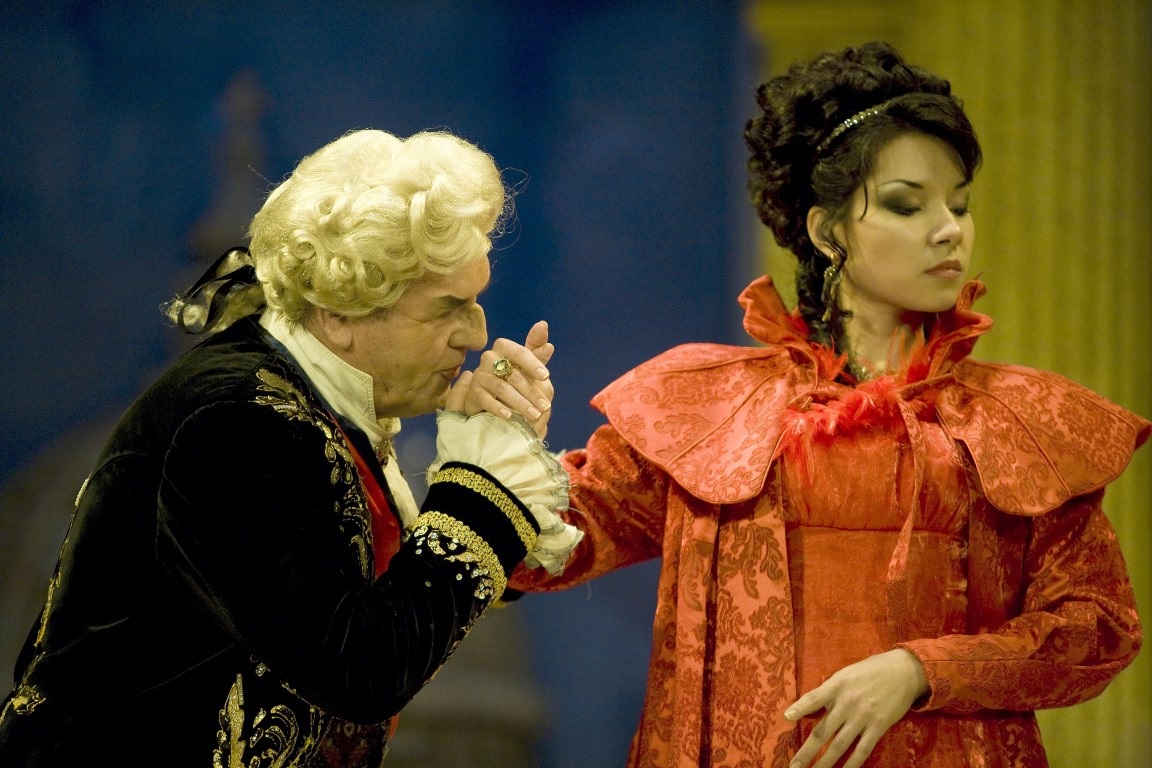 United Kingdom Puccini, Tosca: Soloists of Chisinau National Opera, Members of the Orchestra of the National Opera & Ballet Theatre of Moldova ‘Maria Biesu’ and National Philharmonic of Moldova ‘Serghei Lunchevici’, Vasyl Vasylenko (conductor), Grand Theatre, Blackpool, 7.2.2016 (MC)
United Kingdom Puccini, Tosca: Soloists of Chisinau National Opera, Members of the Orchestra of the National Opera & Ballet Theatre of Moldova ‘Maria Biesu’ and National Philharmonic of Moldova ‘Serghei Lunchevici’, Vasyl Vasylenko (conductor), Grand Theatre, Blackpool, 7.2.2016 (MC)

Libretto written by Giuseppe Giacosa & Luigi Illica based on the dramatic play La Tosca play by Victorien Sardou
Sung in Italian with English surtitles
Cast:
Floria Tosca – Maria Tonina
Mario Cavaradossi – Ruslan Zinevych
Baron Scarpia – Vladimir Dragos
Cesare Angelotti – Roman Balko
A Sacristan – Valeriu Cojocaru
Spoletta – Ruslan Pacatovici
Sciarrone – Iurie GiscaJailer – Valeriu Cojocaru
Shepherd Boy – Harry Johnson
Students of Stagecoach Theatre Arts Kendal
Production:
Direction – Ellen Kent
Assistant – Ruslan Zinevych
Assistant Producer – Juliet Bath
Lighting – Valeriu Cucarschi
Production/Company Manager – Neil Morton
Conductor – Vasyl Vasylenko
Under the direction of Ellen Kent this was a traditional production of Tosca sung in Italian with English surtitles. In the last few years I’ve seen and thoroughly enjoyed Luc Bondy’s direction of Tosca staged so successfully in Munich, Carl Riha’s memorable production in Berlin and Johannes Schaaf’s sympathetic staging in Dresden. Compared to those illustrious rival houses the Frank Matcham designed Grand Theatre in Blackpool might have a smaller stage and Ellen Kent certainly has a tinier budget, yet this perceptive and entertaining production made a strong impression being full of energy and felt as if it was over almost too quickly.
Congratulations to the production team for devising a conventional set, pared down to basics, in which the main components were used as the foundation for each act. In Act One the inclusion of a large oil painting in progress of Mary Magdalen accessed by wooden steps and platform and on the floor a statue of the Madonna and the set convincingly becomes the side chapel of the Sant’Andrea della Valle, Rome. For Act Two a chaise-longue and luxuriously decorated table with candelabras transformed the set into Scarpia’s plushly appointed apartment at Palazzo Farnese complete with four nubile handmaidens paying the Baron great attention. Simplest of all, in Act Three a few simply contrived black painted bars at the windows together with a modest degree of imagination and the stage easily became the Castel Sant’Angelo prison. Although the set design may have been relatively simple the period costumes were lavish and quite beautiful on the eye.
Mario Cavaradossi’s romanza Recondita Armonia is one of the most celebrated moments in opera and highly moving if done well. It is extremely difficult to pull off as it comes so early in Act One of the opera, before the singer’s voice has warmed up. Ukrainian tenor Ruslan Zinevych as the lovesick artist delivered Recondita Armonia and E lucevan le Stelle with affectionate sensitivity providing a convincing degree of passion. Zinevych was clearly extremely comfortable with his high notes although I was left wanting additional tone colour. At times Zinevych’s acting could have been more persuasive for example his rather feeble effort at mixing the colours on the palette and his brush strokes of the large painting of Mary Magdalen.
In a previous Ellen Kent production of La Traviata soprano Maria Tonina was mightily impressive as Parisian courtesan Violetta Valery. Now as the celebrated singer Floria Tosca, Tonina was ardently compelling as the vulnerable and rather naive heroine dressed in a stunning flame red gown. The despairing Tosca’s famous Act Two aria Vissi d’arte was sung by Tonina with an affecting tenderness and sense of solitude, all very persuasive. At the conclusion Tosca’s fall from the parapet of Castel Sant’Angelo may have been simply executed but it worked most effectively.
Stealing the show was Vladimir Dragos who made a menacing chief of police Baron Scarpia – a flawed character, suitably unsavoury and licentious. Immaculately dressed with a grey wig when he took off his long frockcoat with black and gold regal brocade it was hard not to notice his extra tight black velvet trousers and knee high grey leather boots. In his apartment, left alone with Tosca, Scarpia’s considerable aria Già mi dicon venal was delivered with a sense of real intimidation as dreadfully he sexually assaulted her. The episode when Tosca stabbed Scarpia was extremely well done, providing a dramatic ending to a powerfully affecting scene.
Making the most of their minor parts Iurie Gisca playing Sciarrone and Valeriu Cojocaru as the Sacristan are both splendid singers and I look forward to seeing them in more substantial roles. Of note too was the Te Deum scene that closes Act One; it’s a colourful procession of grandeur and reverence with such glorious music that I always find it moving. Conductor Nicholae Dohotaru did his usual consistent job with his committed group of musicians keeping a steady pace throughout. Uncertain at times was the intonation of the high strings (only three violins surprisingly and four violas) but what impressive woodwind playing we heard and the brass section excelled too.
Ellen Kent’s Tosca was a dramatic and entertaining evening to savour in Blackpool. I for one can’t wait for the company’s next visit but perhaps it’s time for Them to look outside the best known repertory.
Michael Cookson
